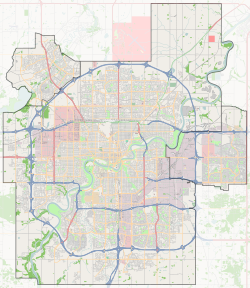McQueen is a residential neighbourhood located in west Edmonton, Alberta, Canada. It is named for the Rev. David George McQueen, who served 43 years as minister at Edmonton's First Presbyterian Church from 1887 to 1930.[6]
McQueen | |
|---|---|
Neighbourhood | |
Location of McQueen in Edmonton | |
| Coordinates: 53°33′14″N 113°34′23″W / 53.554°N 113.573°W | |
| Country | |
| Province | |
| City | Edmonton |
| Quadrant[1] | NW |
| Ward[1] | Nakota Isga |
| Sector[2] | Mature area |
| Government | |
| • Administrative body | Edmonton City Council |
| • Councillor | Andrew Knack |
| Area | |
| • Total | 0.7 km2 (0.3 sq mi) |
| Elevation | 673 m (2,208 ft) |
| Population (2012)[5] | |
| • Total | 1,688 |
| • Density | 2,411.4/km2 (6,245/sq mi) |
| • Change (2009–12) | |
| • Dwellings | 889 |
Immediately to the north east of McQueen, in the neighbourhood of Woodcroft is Coronation Park. Located within Coronation Park is the Telus World of Science (formerly called the Edmonton Space and Sciences Centre), the Peter Hemingway Fitness and Leisure Centre, Coronation Arena (an ice arena), a small football stadium and a lawn bowling facility.
Located a short distance to the east of the neighbourhood along 111 Avenue is Westmount Centre, a shopping mall. There is also a small strip shopping centre located at the south east corner of the neighbourhood.
The neighbourhood is bounded on the north by 111 Avenue, on the east by 142 Street, on the south by 107 Avenue, and on the west by 149 Street. McQueen Road passes through the neighbourhood. The Edmonton neighborhoods that border McQueen are Huff Bremner Estate to the north, North Glenora to the east, Grovenor to the south, and High Park to the east.
The community is represented by the McQueen Community League, established in 1955, which maintains a community hall, outdoor rink, tennis courts and basketball courts located at McQueen Road and 108 Avenue.[7][8]
Demographics
editIn the City of Edmonton's 2012 municipal census, McQueen had a population of 1,688 living in 889 dwellings,[5] a 1.8% change from its 2009 population of 1,658.[9] With a land area of 0.7 km2 (0.27 sq mi),[4] it had a population density of 2,411.4 people/km2 in 2012.[4][5]
Residential development
editAccording to the 2001 federal census, the majority of residential construction in McQueen occurred between the end of World War II and 1960. It was during this time that six out of ten (60.2%) of residences were constructed. Construction continued at a reduced rate during the 1970s before tapering off in the early 1980s. Residential construction was almost nonexistent between the early 1980s and the late 1990s when there was a sharp increase in residential construction.[10]
The most common type of residence, according to the 2005 municipal census, is the single-family dwelling. These account for roughly half (54%) of all residences in McQueen. Another one in four residences (28%) are rented apartments in low-rise buildings with fewer than five stories. Most of the remaining residences are described as a collective residence accounting for 15% or all residences in the neighbourhood. There are also a few duplexes[11] accounting for 3% of all residences.[12]
Occupancy of residences in McQueen is split almost equally between owner occupancy (51%) and rental occupancy (49%). Overall, the population is relatively stable, with almost two out of three (64.5%) residents having lived at the same address for at least three years and just over half (53.9%) having lived in the neighbourhood for more than five years. Just under one in five (17.7%) of residents have moved within the preceding 12 months.[13][14]
Schools
editThere are four schools in the neighbourhood.
- Archbishop MacDonald High School
- Edmonton Christian West School
- Edmonton Christian High School
- Edmonton Menorah Academy
St. Gregory Catholic School previously operated in the building now used by Edmonton Menorah Academy. McQueen Elementary School previously operated in a building that now forms part of Edmonton Christian West School's campus.
Located in the adjacent neighbourhood of Woodcroft is the Edmonton Public School Board's Ross Sheppard High School.
Surrounding neighbourhoods
editSee also
editReferences
edit- ^ a b "City of Edmonton Wards & Standard Neighbourhoods" (PDF). City of Edmonton. Archived from the original (PDF) on May 3, 2014. Retrieved February 13, 2013.
- ^ "Edmonton Developing and Planned Neighbourhoods, 2011" (PDF). City of Edmonton. Archived from the original (PDF) on September 4, 2013. Retrieved February 13, 2013.
- ^ "City Councillors". City of Edmonton. Retrieved February 13, 2013.
- ^ a b c "Neighbourhoods (data plus kml file)". City of Edmonton. Retrieved February 22, 2013.
- ^ a b c "Municipal Census Results – Edmonton 2012 Census". City of Edmonton. Retrieved February 22, 2013.
- ^ The neighbourhood description in the City of Edmonton map utility mentions naming of the neighbourhood for a Rev. G. D. McQueen who arrived in Edmonton in 1887. The article on Edmonton's First Presbyterian Church mentions a Reverend David George McQueen, who arrived in Edmonton in 1887 and who was minister of the church for 43 years, and is the same person.
- ^ "McQueen Community League". McQueen Community League. Retrieved October 12, 2017.
- ^ Kuban, Ron (2005). Edmonton's Urban Villages: The Community League Movement. University of Alberta Press. ISBN 9781459303249.
- ^ "2009 Municipal Census Results". City of Edmonton. Retrieved February 22, 2013.
- ^ Period of Construction
- ^ Duplexes include triplexes and quadruplexes.
- ^ Dwelling Unit by Structure Type and Ownership
- ^ "2005 Municipal Census - Dwelling Unit by Structure Type and Ownership" (PDF). City of Edmonton.
- ^ "2005 Municipal Census - Length of Residence" (PDF). City of Edmonton.

